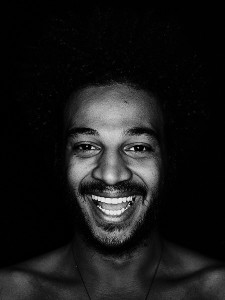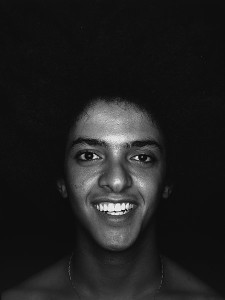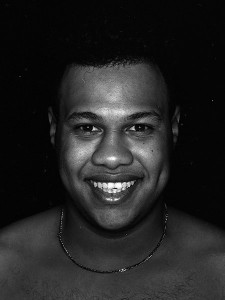(THIS ARTICLE IS MACHINE TRANSLATED by Google from Norwegian)
Photo: Ali Arkady
We have a knack for simplifying Iraq and the country's 35 million population by splitting it into a Shiite Muslim south, a Sunni Muslim center and a Kurdish north. Rather, the reality is that every single city and every tab of Iraq is a mix of different ethnicities and faiths – or of Iraqis who view their common religion and their common descent in different ways. In one way it is true: Shia comprises the majority of the population, around 60 percent. But rather than consisting of a majority and a minority, Iraq consists of a patchwork of minorities. And where one group dominates, you soon discover that it is due to war and violence, that people are forced to flee, that it is not possible to return. In other words, homogeneity is far from being "natural" – it is man-made. In Iraq, and not just in Iraq, coexistence is the natural state.
Therefore, there is one decision the United States is particularly criticized for: When they cast Saddam Hussein, they established a political system in which every appointment, position and contract is now linked to sectarian affiliation. As in Lebanon. Or Bosnia. In today's Iraq, the head of state must be a Kurd, the prime minister must be Shia, and the leader of parliament must be Sunni. Regardless of other circumstances. Regardless of qualifications, and more importantly, regardless of the election results. Regardless of the will of the people. The system is based on the delusion that Sunnis and Shi'ites cannot work together, and ended up as a self-fulfilling prophecy, according to many Iraqis: The scheme did not confirm existing divisions, they say, rather it created divisions.
There is a lot of focus on ethnicity, religion, and collective identities, but there is still one group of Iraqis that goes completely unnoticed: the Iraqis you meet every single day. Iraqis of all kinds of backgrounds. All ages, all classes, all parts of the country. While Sunnis and Shias are fighting in the streets, they have shut themselves in their apartments and are waiting for the day when all this will be over.
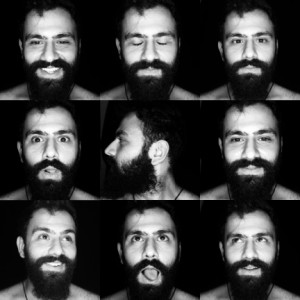
Murthada (23)
“My dream is to become a photographer. I actually have two dreams: The other is to drink red wine. For my best friend is Italian – he's from Pavia. Nicola, he is called. He is studying geology. We met three years ago in Istanbul, and since then we have hung together like peas. But only on Facebook, Whatsapp and Skype. For a young Iraqi, it is not possible to get a visa to Europe. Nicolas's parents do everything they can to help me with papers, with the embassy, because the application process is a maze. You have to have three letters of invitation, health insurance, a bank deposit of several thousand dollars, and also a final interview, like a bachelor's degree – but of course everyone thinks a 23-year-old Arab comes to Italy to stay, and never goes back again. So I've never been called in for an interview. The application is also rejected without explanation, and you have no idea if there is any point in trying again. But I have no desire to move to Italy. We are not ready to leave Iraq. For me, Europe is a different and strange world, just as it is for you in the Middle East. I would not adjust and feel at home just because I could find a kebab down the corner. I will stay here. I just want to be able to travel, just like you, I want to go and come back again. And in Italy, I should have liked to have seen the footage of my favorite filmmaker, Giuseppe Tornatore. I want to see Sicily. I don't see why you are so self-centered. In the beginning, my family, not just Nicolas, was skeptical. His parents were anxious that I could be an Islamist, a terrorist, and my parents were afraid that this foreigner could be an anesthetist or a trafficker. Because he's Italian, right? It's dangerous, after all. The Mafia is everywhere. ”
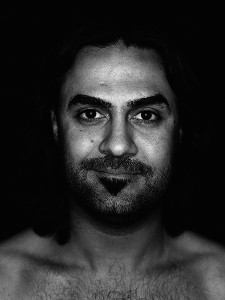
Ahmed (31)
“Out of alleged respect for culture, traditions, diversity and countless other examples of nefarious claims, we gave reason on the boat and made explanations and justifications for things we should not have explained or justified. For the real problem here, it's religion. Do you think it's normal for everyone to walk around and ask each other if we are Sunnis or Shias? And who are the Yazidis, who the Shabakas are, and whether they worship the Virgin Mary, a tree or a stone? At times, Baghdad is exposed to these surreal pilgrimage trains, people who bang their heads in the mosques' doorsteps, kiss floors, books and stuck-up pictures, whipping themselves. Every day is a martyr or a miracle to celebrate, and most strangely – but did you see them last week? They gathered here from all over the country by crabbing on the ground, I mean seriously crab: like giant frogs. Mile after mile. Crawling. And they curse each other and stab each other with a knife, they blow themselves up for something that would otherwise just be a tourist attraction. If I end up being grilled by a car bomb, it must at least be a worthy cause. Melting of glaciers, famine disasters in Africa, or a treatment method for cancer. But not for a lamppost declared as a saint.
And in Europe, you defend all this, calling it respect for local culture and society. But who decided that Islam er Iraq, and there is nothing else here? Just Sunnis and Shias and Tulls here and there? An identity is not a black and white label. It is far more complex and diverse than it was. I'm from here, me too. ”
The misconception that Sunnis and Shias cannot work together ended up as a self-fulfilling prophecy.
Ahmed (24)
"There are no good and bad books when it comes to play. Only books you feel close to, that you are captivated by – or not. One of the lyricists I like best is Rilke. Rilke when he writes that life is short, but the day is long. For Baghdad, a city is gaining momentum on your energy. It will never be complete enough in Baghdad, one is never properly completed. It is a city of great diversity. A city that contains a touch of every citizen, layer by layer. Generation after generation. Everything here refers to a different story. Contains another world. Everything is reminiscent of another time. Baghdad is a hotbed of the imagination. And when you live here, you're also used to living… a life of depth. Immersed in complex themes, incessantly faced with moral and intellectual challenges. Identity. The Other, the differences, the exchanges. The mutual recognition. Fairness. Dignity, freedom. Compromise. Or fight, maybe, resistance. For you, these are topics for doctoral dissertations, here's a cup of tea with friends. I like Rilke for another reason as well: It's a name no one expects mentioned by an Iraqi. According to you, and many Arabs too, Rilke does not belong in my culture. I'm black, my ancestors came from Kenya, and I like Rilke, and I like Roth and Franzen and dance music, simply because that's what I like. We are not just our traditions. Everyone is concerned about the past here. But when it comes down to it, we are what we want to be. We are just products of ourselves. ”
If you're in your twenties or thirties here, war is the only thing you have experience with.
Ammar (21)
'I come from a family of hardheads. I come from one of the poorest and most dangerous slums in Baghdad. A Shia neighborhood where everyone belongs to one or another militia. And that was what I also wanted to be as a boy: a warrior. For that children will be told about warriors as good-hearted, brave guys who are ready to die to defend you. Create justice. A slum is a slum: You are completely cut off from the outside world. The pressure of conformity is… it is not even a question of pressure, because here there is only one model of reality, and there is no question of anything else. No one knows that this is not the only reality. But one day I saw happen to a play that focused on the area I stayed in. Set with a critical eye, of course. Or more precisely: from a standpoint I had never thought of. The warriors ours was no heroes, but rather thugs and killers. Not driven by ideals, but the urge to money and power. And that was where it all began for me. The curiosity about what was going on outside my little world was aroused. It dawned on me that I'm a person, not a Shia. I'm not my family, I'm not the neighborhood. A neighborhood where no one values my choice, of course – I'm a student, I'm not a warrior: I'm a traitor. But I would not have ended up on one front or another to defend my country if I had become a warrior. I had simply ended up terrorizing the streets with a Kalashnikov and finlandshette, totally convinced that I was strong, as all the friends I grew up with. Who have never in their lives seen anything else. They think they are the strong ones. Instead, there are those who are attacked, it is they who must be defended, there are those who are vulnerable – because they do not exist. They are simply what the environment decided they should be. "
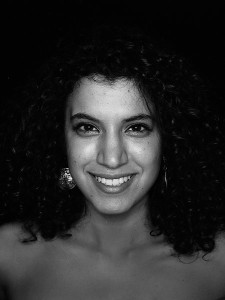
Sea (23)
"I was in the Baghdad belt and was filming something completely different. I walked around the dusty streets amid collapsed buildings and empty homes, and something was so strange, without my finger, what it was. Then it dawned on me. There were no men there. Only women. All the men were killed. And there was an old woman there who had lost everyone – her husband, her sons, her grandsons – and she had been crying desperately so much and for years that she had become blind. Can you imagine what it is like for a child to grow up in such a place? Such a hell? I am a documentary filmmaker, and therefore I am concerned with social things such as marginalization, misery and inequalities, which are both causes and results of violence. Nevertheless, the media usually has the attention only on the front lines. Against warriors. Without ever reflecting on where the warriors come from – their background, the reasons why they act as they do.
I'm concerned about these things too because I think stories can change a bit. It is not just about producing events, being eyewitnesses and keeping up with memories. It's not just about the future. A father who watched a television documentary about beggars suddenly recognized his son on screen – a boy who was kidnapped four years earlier and the police were finally able to get him released.
Now I'm working on fabric about war traumas. This is something no one is talking about, because in Iraq it is considered humiliating to ask specialists for advice and ask for help. But if you're in your twenties or thirties here, war is the only thing you have experience with. In Iraq, violence is no longer a matter for negotiators, it's a matter for psychologists. ”
Mahmoud (19)
“The foreign country I am most curious about at the moment is the Green Zone. I can't get into it, it's the only part of Baghdad I've never visited – I have no idea what it looks like there. And that is the seat of power. When it comes down to it, it is completely meaningless: You wage a war and leave a million dead to control a regime that exercises power without any form of control, without being accountable to anyone – and then replacing it with a regime of power. of the same type, out of the reach of citizens. Or, to be honest, I'm not curious at all. I'm not sorry I can't hang out with the green zone guys. They are just a bunch of idiots. It's just plain crazy, I have no clue who they are, and they have no idea who I am – except they want to change me,
modernize me. But the only thing they know about Iraq is the road to the airport, and the stories of living entrenched here. This is Iraq. This is our place, it serves no purpose to build barriers, we will always find a way to hit them. Security does not come from walls, it is the other way around, it comes from mutual knowledge of each other. Of trust. I admit that treating them like a bunch of idiots is an instinctive reaction. Because at the same time, it's like living in an eternal doubt: Are they wrong, or am I doing it? It's like living in a shadow. With this ghost that monitors you, and every moment reminds you that you are nothing. You, your culture, your community – we are nothing but archaic legacies after a dark age. Everywhere everyone is smarter than us. And how can I rebuild Iraq if I have no faith in myself? Maybe that's where it lies, the most dangerous form of insecurity. "
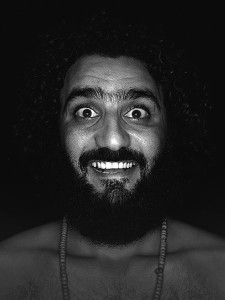
Hishãm (32)
"I have no feelings for Baghdad. To say it is true, I think it's time to get rid of this rhetoric locations. 'The roots of your' 'home country'. Baghdad has no meaning for me. No value at all. When I think of Baghdad, I think of my friends. In my life. I do not care about anything else. All asking you to sacrifice yourself for the country's cause, for the people's cause. But has the country ever sacrificed for me? What have I gotten from Iraq? My brother died of a common disease. A disease there is treatment. And it was not because of the sanctions, it was not because of a lack of medicine. It was not because of war, because of poverty, because of the United States, because of Sunnis or Shiites. No, my brother was just killed by negligence. Of ignorance and error handling. We asked for an autopsy, we asked doctors to look into the case his and learn from the mistakes that were committed. But they never answered. A crazy death, and a useless death. In this country there is nothing that works, and everyone blames Bush, Bremer and religion. But no one goes in to improve things. Nobody tries to be a professional doctor instead of wasting time arguing about Iran and Saudi Arabia. Here you are asked to fight and to be a loyal citizen – not just to pay taxes and obey the law. You will also be asked to sacrifice their lives, but for what? It's time to fix our eyes on people rather than on places. It's time to forget maps and geography – and instead of asking what this city means to us, and what binds us to this country, we need to ask ourselves what vi means to us: what binds us together. It is time to turn down your priorities. As James Joyce said: Let my country die for me. ”
Borri is an Italian war reporter, her latest book has been translated into Norwegian.


